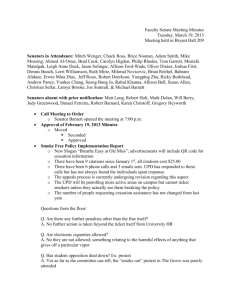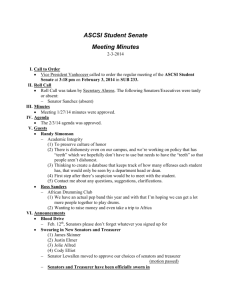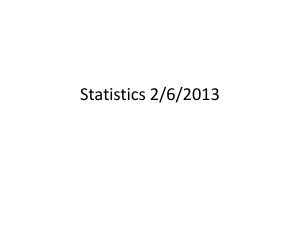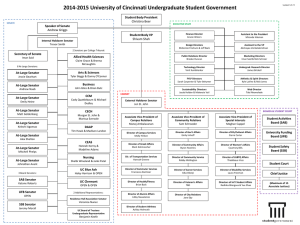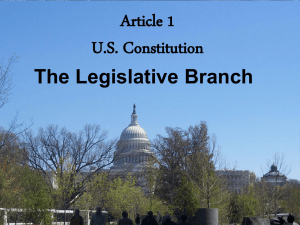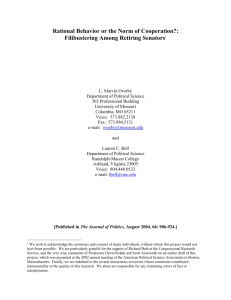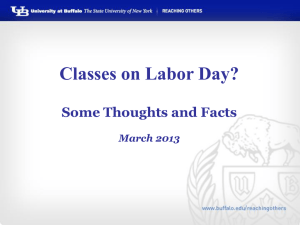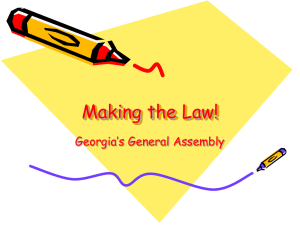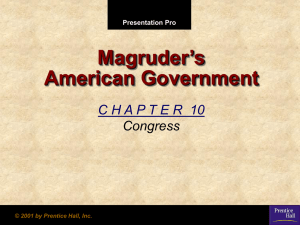filibuster education
advertisement
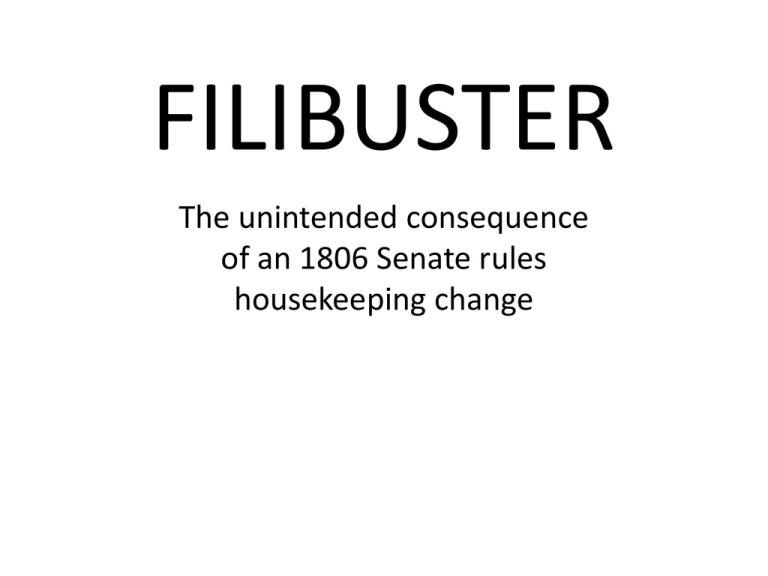
FILIBUSTER The unintended consequence of an 1806 Senate rules housekeeping change “the previous question” motion “the previous question” motion Senators were gentlemen. They knew when to stop talking . 1806 The Senate eliminates rules that are redundant, including that of making a motion “for the previous question”. 1806 The Senate eliminates rules that are redundant, including that of making a motion “for the previous question”. 1837 An attempt to stop the expunging of Andrew Jackson’s 1834 censure by the Senate. It failed. 1806 The Senate eliminates rules that are redundant, including that of making a motion “for the previous question”. 1837 An attempt to stop the expunging of Andrew Jackson’s 1834 censure by the Senate. It failed. 1841 Senator William King filibusters against Senator Henry Clay’s bill to charter the Second Bank of the United States. The filibuster went from February 18 to March 11. It succeeded. 1806 The Senate eliminates rules that are redundant, including that of making a motion “for the previous question”. 1837 An attempt to stop the expunging of Andrew Jackson’s 1834 censure by the Senate. It failed. 1841 Senator William King filibusters against Senator Henry Clay’s bill to charter the Second Bank of the United States. The filibuster went from February 18 to March 11. It succeeded. 1917 Cloture comes into being. Requires 2/3 of Senators voting. 1806 The Senate eliminates rules that are redundant, including that of making a motion “for the previous question”. 1837 An attempt to stop the expunging of Andrew Jackson’s 1834 censure by the Senate. It failed. 1841 Senator William King filibusters against Senator Henry Clay’s bill to charter the Second Bank of the United States. The filibuster went from February 18 to March 11. It succeeded. 1917 Cloture comes into being. Requires 2/3 of Senators voting. 1919 Cloture first used successfully to approve the Treaty of Versailles. 1806 The Senate eliminates rules that are redundant, including that of making a motion “for the previous question”. 1837 An attempt to stop the expunging of Andrew Jackson’s 1834 censure by the Senate. It failed. 1841 Senator William King filibusters against Senator Henry Clay’s bill to charter the Second Bank of the United States. The filibuster went from February 18 to March 11. It succeeded. 1917 Cloture comes into being. Requires 2/3 of Senators voting. 1919 Cloture first used successfully to approve the Treaty of Versailles. 1927 1962 11 successful filibusters, mostly by Southern Democratic Senators opposing civil rights legislation. 1806 The Senate eliminates rules that are redundant, including that of making a motion “for the previous question”. 1837 An attempt to stop the expunging of Andrew Jackson’s 1834 censure by the Senate. It failed. 1841 Senator William King filibusters against Senator Henry Clay’s bill to charter the Second Bank of the United States. The filibuster went from February 18 to March 11. It succeeded. 1917 Cloture comes into being. Requires 2/3 of Senators voting. 1919 Cloture first used successfully to approve the Treaty of Versailles. 1927 1962 11 successful filibusters, mostly by Southern Democratic Senators opposing civil rights legislation. 1949 Change from 2/3 of Senators voting to 2/3 of all Senators. 1806 The Senate eliminates rules that are redundant, including that of making a motion “for the previous question”. 1837 An attempt to stop the expunging of Andrew Jackson’s 1834 censure by the Senate. It failed. 1841 Senator William King filibusters against Senator Henry Clay’s bill to charter the Second Bank of the United States. The filibuster went from February 18 to March 11. It succeeded. 1917 Cloture comes into being. Requires 2/3 of Senators voting. 1919 Cloture first used successfully to approve the Treaty of Versailles. 1927 1962 11 successful filibusters, mostly by Southern Democratic Senators opposing civil rights legislation. 1949 Change from 2/3 of Senators voting to 2/3 of all Senators. 1975 Change from 2/3 of all Senators to 3/5 of all Senators. 2/3 of the Senators present and voting 2/3 of the Senators present and voting Simple majority on the first day of a new Congress (maybe) 2/3 of the Senators present and voting Simple majority on the first day of a new Congress (maybe) The “nuclear” or “constitutional” option 2/3 of the Senators present and voting Simple majority on the first day of a new Congress (maybe) The “nuclear” or “constitutional” option By lawsuit through the Supreme Court Rank State Senator Time Purpose 1 SC Strom Thurmond 24:18 Stop the Civil Rights Act of 1957 2 NY Alfonse D’Amato 23:30 Stop removal of military funding in his state 3 OR Wayne Morse 22:26 Stall debate on Tidelands Oil Bill 4 WI Robert La Follete 18:23 Stop US Treasury from lending to banks 5 WI William Proxmire 16:12 Stop increase in the public debt ceiling Outcome Mississippi Senator Theodore Bilbo filibustered a 1938 anti-lynching bill in an effort to protect "Saxon civilization." BUST THE FILIBUSTER
